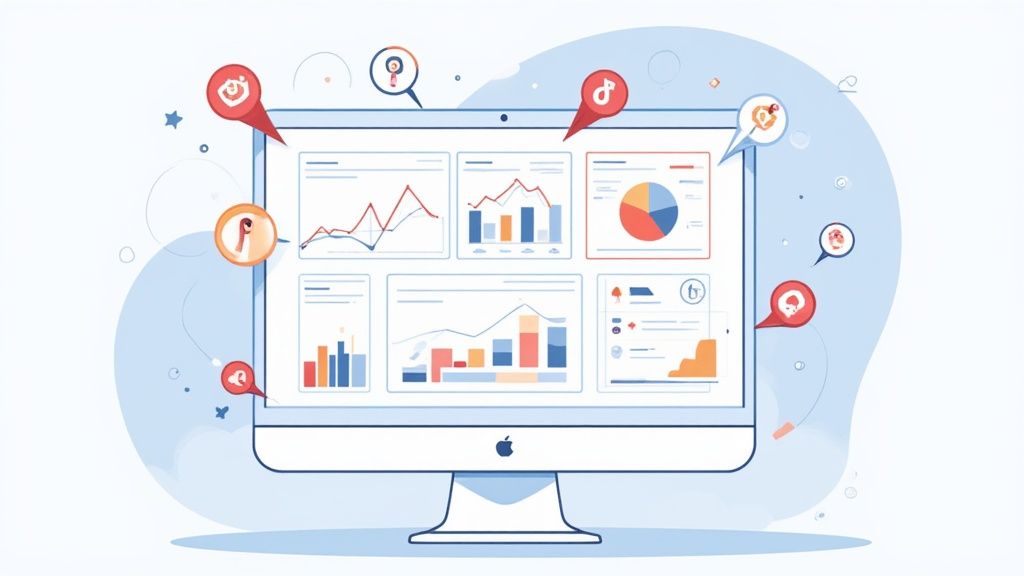
Influencer Marketing Training: Elevate Your Brand
Published
Why Influencer Marketing Training Is No Longer Optional

Influencer marketing has rapidly transitioned from a supplementary tactic to a core component of successful marketing strategies. It's now a primary driver of brand awareness, engagement, and revenue growth. This shift underscores the need for influencer marketing training to effectively leverage this powerful tool. Seasoned marketing directors recognize that well-trained teams are essential for maximizing campaign ROI. Investing in upskilling your workforce is no longer optional; it's a necessity for staying competitive. For those looking to break into this field, this guide may be helpful: How to get into influencer marketing.
This evolution is a direct result of the significant impact influencer marketing has had across various industries. It signifies a fundamental change in how consumers discover and engage with brands. The industry itself has experienced remarkable growth, transforming into a substantial market. By 2023, the global influencer marketing industry was valued at $21.1 billion, a significant increase from its $1.7 billion valuation in 2016. This growth is largely due to its effectiveness, with businesses often seeing higher returns compared to traditional marketing.
For example, businesses typically earn $6.50 for every dollar invested in influencer marketing. This impressive ROI makes training a strategic investment, not an expense. You can explore more in-depth statistics on influencer marketing effectiveness here. This data further reinforces the importance of equipping marketing teams with the right skills.
The Competitive Edge of Trained Teams
Successful influencer marketing campaigns require more than just a basic understanding of the field. They demand a deep understanding of several key areas:
- Influencer selection
- Content strategy
- Campaign measurement
- Relationship management
This is where tailored training programs become invaluable. They equip marketers with the necessary knowledge and skills to navigate the intricacies of this dynamic landscape. Training also helps marketers identify and avoid common pitfalls, ensuring campaigns resonate with target audiences and achieve their objectives.
Continuous Education in a Dynamic Field
The influencer marketing landscape is constantly evolving, with new platforms, trends, and best practices emerging regularly. Continuous influencer marketing training is essential for teams to stay ahead of the curve. This allows brands to adapt to the changing dynamics of social media and maintain a competitive edge. Ongoing training also fosters a culture of learning and innovation within marketing teams, encouraging experimentation and optimization of strategies for long-term success.
Core Skills That Transform Ordinary Marketers Into Influencer Pros

Building on a solid understanding of social media, effective influencer marketing training cultivates specific skills crucial for successful campaigns. These skills extend beyond simply creating and posting content. They encompass strategic planning, relationship management, and analytical thinking. This training equips marketers to orchestrate impactful partnerships, moving beyond mere campaign execution. Learn more about best practices in our article, How to master influencer marketing best practices.
Essential Skills for Influencer Marketing Success
Effective training programs concentrate on building a range of practical skills. These include identifying the right influencers for a brand, developing compelling briefs, and negotiating mutually beneficial agreements. Crucially, training helps marketers find the balance between giving influencers creative freedom and maintaining brand control.
Influencer Identification: This involves understanding audience demographics, analyzing influencer engagement, and ensuring brand alignment. It's more than just follower count; it’s about the authenticity and relevance of an influencer's audience.
Brief Development: A well-crafted brief is the campaign's roadmap. It provides clear objectives, key messages, and creative direction while still allowing for influencer input and flexibility.
Relationship Management: Strong, authentic relationships with influencers are essential for long-term success. This requires open communication, mutual respect, and a genuine appreciation for the influencer's creativity.
Negotiation and Contracting: Marketers need skills in navigating partnership agreements. This ensures fair compensation and clearly defined deliverables for everyone involved.
Soft Skills: The Secret Weapon of Top Performers
Beyond technical know-how, certain soft skills consistently set high-performing influencer marketers apart. Training programs develop these competencies through practical exercises and real-world simulations, going beyond theory.
Communication and Interpersonal Skills: Clear, concise communication is essential for building rapport, providing constructive feedback, and managing expectations.
Creativity and Problem-Solving: The ability to think creatively, adapt to change, and find innovative solutions is invaluable in this dynamic field.
Adaptability and Flexibility: The influencer marketing landscape is ever-changing. Adapting to new trends, platforms, and algorithms is key to continued success.
Data Analysis and Interpretation: Analyzing campaign data, understanding key metrics, and deriving actionable insights are crucial for optimizing campaigns and demonstrating ROI.
Building a Framework for Success
Structured training provides a framework for developing these essential skills. This framework helps marketers understand how each skill contributes to overall campaign success and how to integrate them into a cohesive strategy. The result is more effective campaigns and measurable business results.
The following table provides a detailed overview of the core skills typically covered in professional influencer marketing training programs:
Core Influencer Marketing Skills Framework
A comprehensive breakdown of essential skills covered in professional influencer marketing training programs
| Skill Category | Specific Competencies | Application in Campaigns |
|---|---|---|
| Strategic Planning | Setting campaign goals, defining target audiences, platform selection, budget allocation | Developing a cohesive campaign strategy aligned with overall marketing objectives |
| Influencer Identification & Management | Audience analysis, engagement assessment, brand alignment, relationship building, communication | Selecting the right influencers and nurturing long-term partnerships |
| Content & Creative | Brief development, creative direction, content review, brand messaging | Ensuring high-quality, on-brand content that resonates with the target audience |
| Negotiation & Contracting | Contract negotiation, compensation agreements, defining deliverables | Establishing clear expectations and ensuring fair agreements for both parties |
| Campaign Execution & Monitoring | Timeline management, communication, performance tracking, problem-solving | Ensuring smooth campaign execution and addressing any challenges that arise |
| Data Analysis & Reporting | Performance analysis, ROI measurement, reporting, insights generation | Demonstrating campaign effectiveness and informing future strategies |
This framework emphasizes the interconnectedness of these skills, highlighting how they contribute to successful influencer marketing campaigns.
Strategic Planning and Execution
Developing a strategic plan aligned with overall marketing objectives is fundamental. This involves setting clear goals, defining target audiences, and choosing the right platforms. Successful execution demands meticulous attention to detail, timely communication, and proactive problem-solving. These elements combine to maximize impact and achieve desired results. Effective influencer marketing training equips marketers with the strategic thinking and planning skills they need to develop and execute comprehensive influencer marketing strategies. This includes setting realistic goals, allocating budgets wisely, and measuring campaign performance.
Platform-Specific Strategies That Actually Convert

Generic influencer marketing strategies are outdated. Today, successful campaigns depend on understanding the specific nature of each platform. Effective influencer marketing training equips marketers with the platform-specific skills needed to boost real engagement and conversions.
Mastering Instagram for Influencer Marketing
Instagram continues to be a powerhouse in influencer marketing. As a visually-driven platform, high-quality images and compelling storytelling are essential.
Instagram Stories, Reels, and live sessions offer diverse options for influencer collaborations. Integrating these formats into a unified strategy is key.
Staying current with Instagram's algorithm is vital for maximizing organic reach. This means continuous learning and adapting to algorithm updates.
TikTok: Engaging the Short-Form Video Generation
TikTok's rapid growth has changed how brands connect with their audience. Its short-form video format requires a distinct approach.
Influencer marketing training for TikTok focuses on authentic, trend-driven content that resonates with its young user base. Understanding TikTok's unique algorithm, which prioritizes trending sounds and hashtags, is essential for viral success.
This often involves incorporating humor, creativity, and genuine interaction with the TikTok community.
YouTube: The Power of Long-Form Content
YouTube is ideal for in-depth product reviews, tutorials, and longer narratives. This requires a different strategy than shorter video platforms. Training emphasizes developing long-form content.
Working with YouTubers lets brands connect with engaged audiences and build trust through informative and entertaining videos. Effective YouTube influencer marketing depends on building genuine relationships with creators whose audience aligns with the brand's target demographics.
Training and using the right social media platforms is essential for influencer marketing success. For example, in 2023, roughly 76.7% of marketers planned to use Instagram for their influencer marketing strategies. TikTok's growth is also substantial, with 45% of influencer marketing campaigns using the platform in 2022. More detailed statistics can be found here. These numbers highlight the importance of platform-specific influencer marketing training.
Emerging Platforms and Future-Proofing Your Strategy
Social media is always changing. New platforms appear, and existing ones evolve. Influencer marketing training needs to prepare marketers to adapt and embrace these changes.
This includes staying informed about new platforms, understanding their unique aspects, and experimenting with various techniques. By staying ahead of the curve, marketers can future-proof their influencer strategies and maximize their impact across evolving social media channels.
This adaptability is essential for long-term success in the dynamic field of influencer marketing. It requires a mindset of continuous learning and experimentation.
Measuring What Matters: Beyond Vanity Metrics

Effective influencer marketing training helps marketers move past surface-level metrics like follower count and likes. It emphasizes data-driven decisions and demonstrating a tangible return on investment (ROI). This shift is essential for making influencer marketing a core business strategy.
From Vanity Metrics to Meaningful Measurement
Moving beyond vanity metrics requires understanding attribution models, measurement frameworks, and reporting strategies. These tools link influencer actions to real business results. For instance, training teaches marketers to track website traffic from influencer posts, conversions from promotions, and the overall effect on brand awareness.
Influencer marketing training also stresses setting clear objectives and aligning metrics with those goals. This means choosing the right key performance indicators (KPIs) for each campaign. For brand awareness campaigns, reach and impressions may be the primary metrics. Sales-driven campaigns, however, focus on conversions and revenue. You might be interested in: How to master influencer marketing KPIs.
Different platforms also require different strategies. For example, consider how TikTok Shop's affiliate marketing program is being utilized.
The United States currently leads in influencer marketing spend, with an estimated $26.09 billion allocated in 2023. This highlights the strategy's growing importance in American marketing. Find more detailed statistics here. This investment emphasizes the need for effective training to get the best ROI.
Setting Benchmarks and Utilizing Technology
Establishing benchmarks is crucial for gauging influencer marketing success. This means understanding industry averages and adapting them to specific objectives. Training helps marketers set realistic expectations and track progress. This data-driven approach allows for constant optimization.
Influencer marketing training also introduces marketers to technology that streamlines measurement. These tools automate data collection, offer in-depth analytics, and generate detailed reports. Marketers can then focus on interpreting the data and gleaning actionable insights, instead of manually collecting data.
The following table shows a framework for measuring influencer campaign ROI. It compares different approaches and their best uses and limitations.
| Measurement Category | Key Metrics | Best For | Limitations |
|---|---|---|---|
| Brand Awareness | Reach, Impressions, Social Engagement (likes, shares, comments) | Building brand visibility and social buzz | Difficult to directly tie to sales |
| Website Traffic | Click-through rates, Website visits, Referral traffic | Driving traffic to a website or landing page | Doesn't guarantee conversions |
| Sales & Conversions | Conversion rates, Sales revenue, Promo code redemptions | Measuring direct sales impact | Requires robust tracking mechanisms |
| Customer Engagement | Customer lifetime value, Customer acquisition cost | Assessing long-term customer relationships | Complex to calculate, requires long-term data |
This framework helps marketers select the right metrics for their campaign objectives. It's essential to consider both the strengths and weaknesses of each measurement approach.
Interpreting Data and Communicating Insights
Finally, influencer marketing training teaches marketers to understand complex performance data and transform it into clear narratives. This involves recognizing trends, drawing conclusions, and presenting findings to stakeholders. Clearly communicating results is essential for securing buy-in and showcasing influencer marketing’s value.
Focusing on data-driven decisions positions influencer marketing as a strategic investment, not a tactical expense. This change is critical for the field's continued growth and development.
Building Relationships Across The Influencer Spectrum
The days of influencer marketing revolving solely around mega-influencers are over. Today, brands recognize the value of a diversified influencer portfolio. This involves strategically collaborating with influencers across the spectrum, from mega and macro-influencers to micro and nano-influencers. Effective influencer marketing training equips marketers to cultivate meaningful relationships with each group.
Understanding the Influencer Tiers
Understanding the distinct characteristics of each influencer tier is key to successful influencer marketing. Mega-influencers, often celebrities, possess extensive reach but sometimes lack targeted engagement. Macro-influencers have a substantial following within a specific niche, offering a good balance of reach and engagement.
Micro-influencers cultivate highly engaged communities around specific interests, often resulting in higher conversion rates. Nano-influencers have smaller, hyper-local audiences, building deep trust and authentic connections.
Tailoring Approaches for Each Influencer Category
Influencer marketing training stresses the necessity of adapting your approach to each influencer tier. A one-size-fits-all strategy simply won't yield optimal results. Mega-influencers may require more structured campaigns with clearly defined deliverables, while micro-influencers often flourish with more creative freedom.
Compensation also differs. Mega-influencers generally command higher fees, while micro and nano-influencers might be open to product exchanges or smaller monetary compensation. Understanding these nuances is vital for successful collaborations. The influencer landscape itself is changing. By 2023, 69% of brands were working with nano or micro-influencers, driven by higher engagement rates and a desire for authenticity. Find more detailed statistics here.
From Transactions to Partnerships
Influencer marketing training underscores the importance of building long-term relationships with influencers, rather than focusing on one-off collaborations. Cultivating trust and mutual respect requires time and consistent effort.
This involves open communication, valuing the influencer's creative input, and providing constructive feedback. These ongoing partnerships often produce better long-term results, fostering a sense of shared success and more profound brand integration.
Balancing Reach and Engagement
Striking the right balance between reach and engagement is a vital element of a successful influencer marketing strategy. Mega-influencers offer broad reach, while micro-influencers excel at generating high engagement.
Effective training helps marketers evaluate their campaign goals and choose influencers accordingly. For brand awareness campaigns, prioritizing reach may be more beneficial. Conversely, for driving conversions, focusing on engagement might be more impactful.
Aligning With Brand Values
Choosing influencers whose values genuinely align with your brand's values is crucial. Authenticity is paramount in influencer marketing. Audiences quickly detect inauthentic partnerships, which can damage a brand's reputation.
Training helps marketers identify influencers whose values and audience resonate with their brand identity. This involves thorough research, reviewing past collaborations, and evaluating the overall tone and messaging of the influencer's content. This detailed approach ensures genuine and effective partnerships.
Turning Expertise Into Career Advancement
Influencer marketing training isn't just about enhancing existing campaigns. It's a strategic investment in your professional future, acting as a catalyst for career growth. It can open doors to new roles, increased salaries, and broader professional opportunities. This specialized knowledge directly translates to career advancement, empowering marketers to distinguish themselves in a competitive field.
The Value of Formal Training in the Job Market
Formal influencer marketing training demonstrates to potential employers a commitment to professional development and a strong understanding of this dynamic field. Certifications, in particular, can significantly strengthen your resume, showcasing specialized expertise and adherence to best practices.
For example, certifications specializing in platforms like Instagram or TikTok, or those focused on advanced analytics and measurement, can set you apart from other applicants. They highlight your investment in acquiring in-demand skills.
Showcasing Expertise in Interviews and Performance Reviews
Influencer marketing training provides you with the knowledge and vocabulary to confidently discuss your expertise during interviews and performance reviews. You can speak authoritatively about strategies, measurement techniques, and industry trends, showcasing a comprehensive understanding of the subject.
Furthermore, you can share specific examples of how you've applied your training to achieve measurable results in past campaigns. Quantifiable achievements, such as increased engagement, website traffic, or conversions, serve as powerful evidence of your capabilities and value.
Career Paths and Compensation for Influencer Marketing Specialists
The demand for skilled influencer marketing professionals is steadily increasing, leading to a variety of exciting career paths. Roles range from Influencer Marketing Manager and Social Media Strategist to Brand Ambassador and Content Creator. Specialized agencies focusing solely on influencer marketing are also emerging, offering unique opportunities. Many marketers are even using their skills to establish successful consulting businesses, providing strategic guidance to brands.
Salaries in this field vary based on experience, location, and specific role. However, specialized expertise often translates to higher compensation. For instance, Senior Influencer Marketing Managers or Directors of Influencer Marketing typically earn considerably more than entry-level positions.
Learning From Success Stories
Learning from marketers who have successfully advanced their careers through influencer marketing expertise can offer valuable insights and inspiration. Understanding their journeys, the challenges they encountered, and the strategies they employed can be incredibly helpful.
Their advice can cover topics like networking within the industry and negotiating salaries, providing a practical perspective on the potential within the influencer marketing field. Ready to take the next step? Explore job opportunities at Influencer Marketing Jobs.